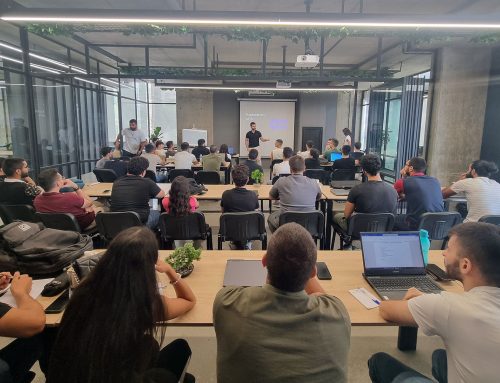Artificial Intelligence is set to contribute $135 billion to the Saudi economy in 2030; how much will the banking and fintech sector benefit from it? AI is disrupting every industry across the globe. The GCC, like the richest countries in the world, is competing for leadership in this field. Unlike the governments of the United States and the United Kingdom, which allow for investigation and investment before intervening, GCC countries want to be at the forefront of financial innovation and establish authority.
In this blog, we will unveil some of the AI revolution taking place in Saudi Arabia, as a leading country in the tech field in the MENA region.
The Table of Contents
- AI adoption by the banking sector
- How can Saudi institutions benefit from AI?
- Saudi Arabia: “THE” financial hub
- Case Study 1: Al Rajhi Bank’s AI-driven Chatbot
- Case Study 2: STC Pay AI-Powered Fraud Detection
- The future landscape
AI adoption by the Banking Sector
People and businesses are divided over their fast adoption of AI in their daily lives and business operations, as there are challenges and threats that come with AI, not only opportunities. The banking industry appears to be a notable outlier both globally and in the MENA region. According to Google, the financial services and banking sector will be the Middle East and North Africa’s largest spender on AI technology. This observation could be explained by the banking sector’s service nature and importance in people’s lives. Consumers are more and more eager for speed, secure, flexible, and convenient financial services, therefore financial institutions must respond quickly.
How can Saudi Financial Institutions benefit from AI?
AI has numerous applications in the financial sector and it benefits all stakeholders, by ensuring convenience, streamlining processes, and improving user experience.
1- Fraud Detection and Prevention
AI algorithms facilitate the detection of fraudulent transactions in real time preventing financial losses for the bank and its clients.
2- Customer Segmentation and Personalization
AI-powered customer segmentation based on behavior, demographics, and psychographics enables the personalization of products, marketing campaigns, and the overall customer experience.
3- Credit Scoring and Risk Assessment
AI algorithms empower data-driven lending and credit decisions to provide more accurate credit scores resulting in improved loan portfolio quality and lower default rates.
4- Chatbots and Virtual Assistants
AI-powered conversational chatbots provide 24/7 customer support with the ability to answer people in a similar human manner. Their primary functions are to answer queries and assist in transactions while reducing response time and labor costs, leading to more customer satisfaction.
5- Algorithm Trading and Investment Management
AI algorithms analyze market trends, news, and historical data to predict stock prices and make trading decisions in real time. Direct benefits include optimization of investment portfolios, confident decisions in volatile markets, and effective risk mitigation.
6- Anti-Money Laundering (AML) and Know Your Customer (KYC) Compliance
AI and natural language processing (NLP) are used to analyze large volumes of data to improve the detection of suspicious activities, reduce false positives and manual investigations, and enhance regulatory compliance.
7- Customer Churn Reduction
Predictive analytics allow the early identification of a possible customer churn and incite the bank to implement new retention strategies and proactive activities such as personalized offers and targeted messages.
Saudi Arabia: “THE” Financial Hub
Saudi Arabia’s Vision 2030 fosters a business-friendly environment and regulatory reforms encouraging international financial institutions to expand their fintech operations in the Kingdom.
5 main goals are behind these initiatives:
- Diversify the Saudi Economy
- Position Riyadh as a global Fintech hub
- Create 18,000 direct jobs in the financial sector by 2030
- Increase the Foreign Direct Investment (FDI) by $3.2 billion by 2030
- Increase the share of non-cash transactions among individuals to 70% by 2025
The development and implementation of the Kingdom’s Fintech Strategy in 2022 transformed Saudi Arabia into a home for over 200 fintech firms as of August 2023. Furthermore, the Saudi Central Bank (SAMA) designed a Regulatory Sandbox welcoming local and international enterprises interested in testing their products on the Saudi market by minimizing their risks and creating new opportunities. By 2030, the Kingdom hopes to have 525 active fintech enterprises.
Case Study 1: Al Rajhi Bank’s AI-driven Chatbot

Al Rajhi Bank, one of the Kingdom’s leading Islamic banks, intended to enhance customer service and streamline routine interactions. It implemented an AI-powered chatbot named “Rajhi” to assist customers with inquiries, account information, and transactional activities. The conversational chatbot could interpret and answer client concerns in real-time and in a human-like manner by utilizing natural language processing (NLP). The adoption and integration of the Al-Rajhi conversational chatbot
- Reduced response times
- Provided 24/7 customer assistance
- Reduced the need for manual intervention
- Enhanced customer satisfaction
Case Study 2: STC Pay AI-Powered Fraud Detection
STC Pay, a prominent Fintech company in Saudi Arabia, aimed to strengthen its security measures and combat fraudulent activities. To achieve its goal, it integrated AI algorithms for fraud detection, analyzing transaction patterns, user behavior, and other variables to identify potential fraud.
Success was tangible through
- The detection and prevention of fraudulent transactions
- The adoption of the algorithms to new fraud patterns
- The protection of users’ funds and prevention of evolving threats
- The minimization of disruptions for genuine users
The Future Landscape
Artificial Intelligence is changing the way financial institutions work and consumers benefit from financial services.
Saudi Arabia is leading the way with a solid vision, a well-implemented strategy, and active strong partnerships.
The challenge remains how to choose those partners and what kind of partnerships the Kingdom can build.
The answers will either support the efforts of Saudi Arabia or slow it from its goals… let’s discover this in the next blog.




